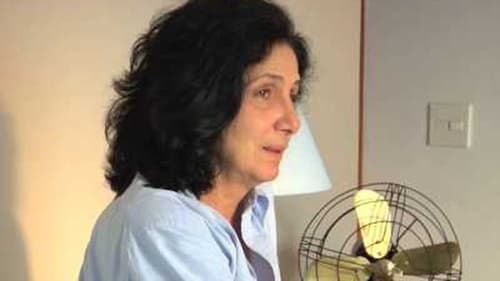Juliana Carneiro da Cunha

Lili
Malu — a mercurial, unemployed actress living with her conservative mother in a precarious house in a Rio de Janeiro slum — tries to deal with her strained relationship with her own adult daughter while surviving on memories of her glorious artistic past.

Lara
В необычный день серия совпадений приводит Эдуардо к встрече с Моникой. И несмотря на то, что они не похожи друг на друга, они безумно влюбляются. Эта любовь должна созреть и научиться преодолевать разногласия.

Israël's Mother
У супругов Лауры и Израэля есть пятилетний сын Лукас. Они живут вместе, но, кажется, полностью потеряли интерес друг к другу. Их отношения стремительно идут под откос, но в семье ещё остался человек, не утративший волю к жизни, и это Лукас.

Teodora
Maria, a virgin spinster, is trying magical superstitions to find a husband. In her dialogue with the marriage saint, she implores for a companion. Her father offered her as a bride to Saint Djalminha, if the saint saved her during her complicated birth which ended in the death of her mother. Since then Maria has lived this dilemma: revered and loved by the residents and pilgrims that believe she is a miracle worker; she is desperate to live a great love, with a flesh and blood prospect with real passionate desire. She asks for a sign from the heavens, a clue on how to find a crumb of love when a gypsy arrives on scene saying "someone who loves her very much, but she doesn't know will come from afar on an artists' caravan." Maria can't take the solitude she is living anymore and decides "to find Mr. Right," no matter how much it may cost.

Forty years separate Maria Eugênia, or Maê, a writer from Pernambuco based out of France, from the couple Miguel and Lúcia, who has just celebrated their 40-year anniversary. Maê's return uncovers old doubts and suspicions. Miguel, a sociology professor and former political prisoner, wants to face the truth, and Lúcia, his life partner who has dedicated herself to getting him out of prison, wants to escape from it. From the point of view of these three main characters we learn about political events.

Dona Zizinha
Бразилия, 1821 год. Суеверный плантатор Антонио в результате разных болезней теряет родных, плантация оказывается в бедственном положении. Антонио посыпает голову пеплом, считая, что разочаровал бога, а оставшихся в живых родственников отправляет в город Серра. На загнивающей плантации остаются в изобилии чернокожие рабы, полоумная бабушка успешного белого человека и его новая жена — 21-летняя племянница последней супруги, Беатрис. За главного временно остаётся свободный чернокожий Иеремия, намеренный вернуть «проклятой» земле былое благополучие.

Bordadeira
Элиас — успешный руководитель, который работает в одном из самых лучших частных банков Бразилии. У него есть все возможности для хорошего профессионального роста, которые ему дает Эйтор, президент банка. По возвращении из командировки и придя в банк, Элиас сталкивается с таинственной женщиной, которая приветствует его по имени и говорит, что в один день он станет вице-президентом банка, а на следующий — уже президентом. Под большим впечатлением, Элиас рассказывает эту историю своей жене Кларе. Клара очень воодушевлена предсказанием незнакомки и предлагает пригласить Эйтора на ужин. С этого момента происходит серия убийств, совершенных парой, которая оставляет за собой кровавый след на пути к власти, которая становится мучителем и жертвой их собственных судеб…

A film-crew in the early twentieth century, the cabaret known as ‘Le Fol Espoir’ has been transformed into an amateur soundstage. The motion picture tells the story of a ship and its passengers – from the famous opera singer down to the petty criminal. The film is an optimistic political fable intended to educate the masses. There’s comedy aplenty – slapstick punches, custard pies and gags reminiscent of Buster Keaton and Fatty Arbuckle; there’s adventure, high drama moments of great bravura , and passionate love stories. The filming begins on June 28th 1914, the day of the Archiduke Franz Ferdinand’s assassination in Sarajevo, the gunpowder that sets Europe alight. It ends with news of another assassination – that of Jean Jaures on July 31st followed by the general conscription of August 1st, heralded by church bells across France. The allegory of the shipwreck is filmed at breakneck pace during the last five weeks before war breaks out.

Suzana
Rodrigo and Suzana have started a relationship recently. He's seventy-two, she's sixty, and they are completely in love with each other. Together, they spend days in bed, talking, eating, laughing and making love.

Viúva Assis
В небольшом колумбийском городке начинают происходить непонятные вещи: каждую ночь в определенный час на стенах домов появляются различные карикатуры, изобличающие секреты местных жителей. Сначала все считают это неудачной шуткой и опровергают слухи. Однако, когда один мужчина, прочитав о неверности жены на стене, убивает предполагаемого любовника, мэр города объявляет чрезвычайное положение. Вооруженные солдаты начинают патрулировать улицы в поисках злоумышленников...

Dinah Lévi-Strauss

Le seigneur Kang, Madame Li
Based on the play by Hélène Cixous, filmed in 2002, Tambours sur la Digue is a story written by Hélène Cixous based on an ancient Asian fable about who shall be saved during a flood and presented by live actors as puppets and puppeteers, evoking the theatrical traditions of Japanese Noh and bunraku.

Mother
Каждый вечер отец собирал их за бедным крестьянским столом. Каждый вечер он говорил своим детям, что семья — это самое дорогое и святое, что когда-либо будет в их жизни. От твердил, что грех никогда ни должен коснуться ни одного из его чад. Строгость отца и безграничная любовь матери в краю, где люди трудятся от заката и до рассвета вдали от неизведанных радостей мирской жизни. Но дети, сидящие за столом слева от отца — это чахлые ветви, проклятые грехом и безумием.

Bailarina
Fantasy comedy about Brazilian writer Oswald de Andrade, one of the most important icons of Modernism in Brazil. In the film, Oswald is played by two actors: Ítala Nandi, as his feminine anima, and Flávio Galvão, as the masculine half.











